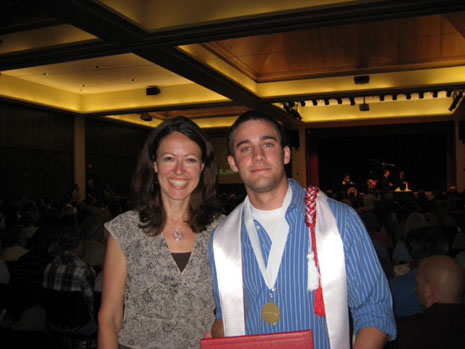
FAYETTEVILLE, Ark. – A new study initiated by undergraduate research at the University of Arkansas Honors College shows that quick signatures on a ballot initiative have a powerful effect on getting out the vote. Janine Parry, a political science professor in the J. William Fulbright College of Arts and Sciences, and her honors student Shayne Henry, along with colleague Dan Smith of the University of Florida, have demonstrated for the first time that signing ballot initiatives propels individual voters to the polls.
Their finding was initiated by Shayne Henry’s Honors College thesis, which used a newly available online tool to examine voter response to Arkansas Act 1 of 2008, an initiated act that proposed restricting adoption and foster care in Arkansas to married couples. Henry’s findings were relatively modest, but were later expanded to include statewide and municipal anti-gay ballot initiatives in Florida. A municipal election in Gainesville, Fla., in particular provided compelling evidence that citizens who sign petitions go on to cast a vote on the issue. All of the samples showed that petition signing is especially persuasive among irregular voters. Their findings will be published in the journal Political Behavior next year and are currently available online.
“This is the first time we’ve been able to test and make claims about the relationship between signing a ballot initiative and voting,” Janine Parry said. “I was excited to have an undergraduate who could conceive of and execute a quantifiable project – because this is the kind of study you can do something with.”
Indeed, in addition to producing a scholarly publication, the project played an important role in a 2010 Supreme Court case, Doe v. Reed (2010), in which the justices ruled in favor of disclosing ballot signature lists. Smith and Parry, together with two other colleagues, submitted a brief in the case that was subsequently referenced in a New York Times article on the proceedings.
“It’s quite remarkable, as an undergraduate student in Arkansas, to be part of a process that is later referenced in oral arguments before the Supreme Court,” said Henry who is now a research associate at the New America Foundation in Washington, D.C.
Know Thy Neighbor, an online database that allows visitors to search for names and addresses of registered voters who sign a petition, provided the key tool for tracking individual voter behavior. Over the course of two months, Henry checked a random sample of 500 registered Arkansas voters against the 85,389 valid signatures that placed Act 1 on the Arkansas ballot. Adjusting for available information on registered voters’ gender and age, which impact the likelihood of voting, Henry found that there was a 20 percentage point increase in turnout among voters who signed the ballot petition. Later studies conducted in Florida expanded the sample and corroborated Henry’s initial finding.
Shayne Henry finished his bachelor’s degree in political science in 2010, earning summa cum laude honors, but Parry continued to keep him in the loop as research continued. Henry said he was particularly excited by the results of studying a 2009 municipal election in Gainesville, Fla., which included all 71,119 voters in the sample. That study found that even “functionally inactive” voters who hadn’t voted in previous elections were twice as likely to vote in the election if they were one of the roughly 6,000 who had signed a petition against an ordinance that extended civil rights to gay and transgendered people.
“It’s really fascinating to see how people think, and how they turn out, when issues are close to home,” Henry said. “Political parties have invested so much in the idea that you can energize your base around core values, but this has never been pushed or tested. It turns out that this idea is true.”
Parry noted that Henry detected other interesting patterns in his research. For example, a plethora of signatures collected on Sundays and, to a lesser extent, Wednesdays, suggest that the ballot initiatives were “passed down the pew” at church gatherings. While she and her colleagues will continue to mine the data collected, Henry has other plans. He will head to law school at the University of California, Berkeley this fall and plans to become an international human rights lawyer.
Topics
Contacts
Janine Parry, professor and director, Arkansas Poll
Department of Political Science
479-575-6439, parry@uark.edu
Shayne Henry, research associate
New America Foundation
918-809-1823, shaynehenry@gmail.com
Ali Williams, interim director of communications
J. William Fulbright College of Arts and Sciences
479-575-8402, art05@uark.edu
Kendall Curlee, director of communications
Honors College
479-575-2024,
kcurlee@uark.edu